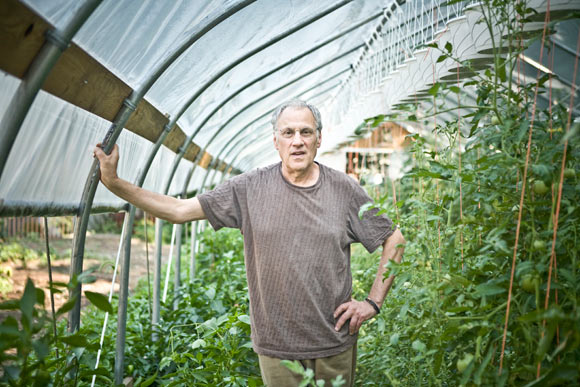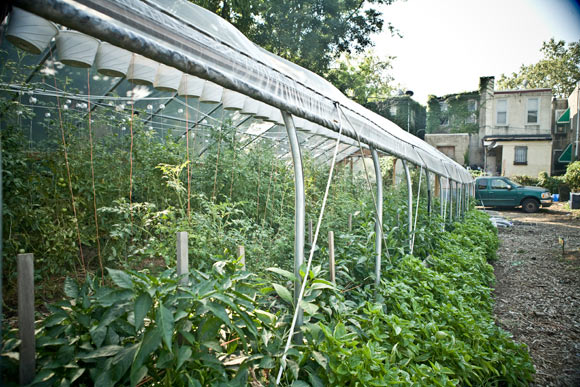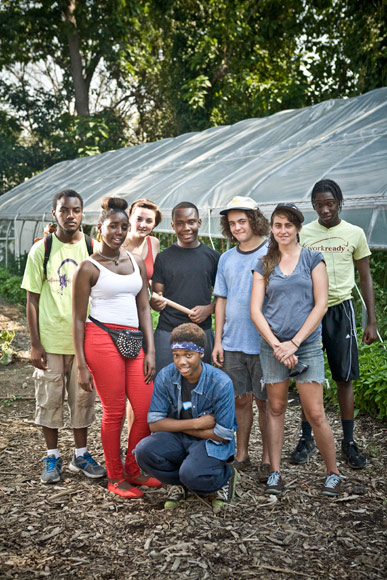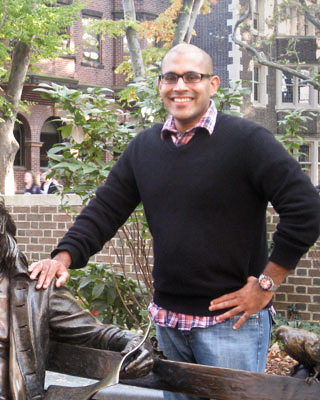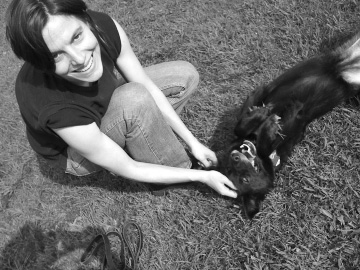Activism is great and all, but Collingswood, N.J., resident Hassen Saker was losing her drive. For several years, she had been volunteering in politics, but “activism wasn’t inspiring me; it was so frustrating,” Saker says. She wanted a more immediate, hands-on way to spark societal change, and the answer wasn’t more volunteer work. It was starting a business.
“I felt like you can reach people on a whole other level, and it’s a lot more personal,” she says of entrepreneurship. Saker and her wife, Heather, founded Organic Home, a “triple-bottom-line” cleaning service, in 2006.
According to Patrick FitzGerald, a lecturer at the Wharton school’s Goergen Entrepreneurial Management Program, attention to that triple bottom line – seeking profit as well as social and environmental responsibility – is “on the rise” in Philadelphia.
That doesn’t mean entrepreneurs with a social-activist bent are easy to find, even around here. “Most people still don’t consider it,” FitzGerald says of new entrepreneurs, who find they have enough on their plates just keeping afloat.
But FitzGerald, also the co-founder and former President of RecycleBank (teaming with retailers to promote recycling and social responsibility in business), says that compared to larger cities, “the advantage of social entrepreneurship in Philadelphia is that you can make a dramatic difference much faster.”
Twenty-eight-year-old Wharton graduate Vikram Bellapravalu found fertile ground in Philadelphia for his business, an innovative hybrid of fundraising and social media.
After undergrad at Princeton, the Phoenix native spent four years on Wall Street before deciding to expand his business expertise through an MBA at Wharton. Soon, his father came to him with an interesting idea.
While organizing an annual golf fundraiser, Bellapravalu’s father thought of asking participants to pledge an extra $5 per birdie. After some research, Bellapravalu realized that “there really weren’t a lot of fun social game types of fundraising sites.” Here was a chance to make micro-donations to charity an easy and popular habit.
He entered Wharton’s Business Plan Competition, developing the concept of Pledge4Good with classmate Leonard Fishman. Partnering with non-profits, the Pledge4Good website allows participants to link small charitable pledges to everyday events of their choice. For example, sports fans can promise a few dollars to a charity upon a favorite team’s win, or dieters can pledge a dollar for every pound they lose.
Through social media, participants can share their success, and invite their friends to pledge, too. Bellapravalu’s plan was a finalist at Wharton, and after a warm reception at a Philly Tech Meetup last year and a summer in Philadelphia’s GoodCompany Ventures entrepreneurship incubator, Pledge4Good launched officially in January. The founders divide their time between offices in Philadelphia and New York.
Bellapravalu notes that his company’s biggest appeal to partner non-profits is that about 75% of the donors who sign up through Pledge4Good have never previously given to the cause they choose.
“We’re not just giving you a $1 check or a $10 check,” Bellapravalu now tells potential partners: his platform represents an entirely new way to identify and motivate future donors.
Bellapravalu admits that while he has big plans, Pledge4Good is still in its early stages. But Skip Wiener, at 70, is proving that in Philadelphia, social entrepreneurship is not merely the province of the young. Since his Urban Tree Connection (UTC) became a non-profit in 1997, he has transformed some of the city’s most blighted areas.
The former landscape architect spent many years in the Philadelphia school district, developing service-learning projects for low-income kids involving gardening and farming. But no matter how successful these school-year programs were, Wiener says, “in July and August these places were shut down tight. They were locked, and maintenance staff refused to do any watering. Everything that I built went back to seed and died.”
But a new initiative through dollars from the William Penn Foundation allowed a council of Haddington-based non-profits, of which UTC was a member, to identify local vacant lots that could be converted to community green spaces. Now twelve years into its current greening projects in the Haddington area, UTC has built gardens on 29 different lots, engaging practical support from locals of all ages to turn the spaces from brothels, drug markets and chop-shops into flourishing community gardens.
Recently, three-quarters of an acre at 53rd and Poplar has drawn particular excitement as a farm, where produce shares, a weekly market, cooking lessons and other educational programs have all taken flight.
“It just absolutely mushroomed,” Wiener says of interest in the farm. Staffers supporting the farm – and others in the works – include ex-cons, local teens and business students.
Wiener says these garden sites result in a powerful new “social cohesion.”
“People who never knew each other,” even on the same block, “all of a sudden are meeting each other, talking to each other, and identifying common issues…this is happening in a community where it was never happening before.”
Wiener is considering how the farm’s food-sale revenue can continue to benefit the community. “We’re very seriously looking at models that will lead us to not just revenue-generating, but how to use the revenue to subsidize food distribution in the low-income food desert,” he says.
Local, sustainable products are also a major focus for Saker’s Organic Home, which in addition to using all-natural products, purchases local goods whenever possible.
Independent local economies are Saker’s passion. “Purchasing locally is such an important aspect of it!” she says of her business, which serves the Philadelphia area. The 43-year-old is committed not only to organic, earth-friendly cleaning products and practices, but also to fair treatment of her employees. She estimates that she pays her workers about 30% more than the average cleaning service does.
“Our goals are to pay our employees a fair wage, a living wage, and that definitely cuts into the company’s budget,” she says. “I don’t make as much, and I can’t afford more advertising…Psychologically, my passion is more for sustainability than it is for business.”
While it took time to establish her business successfully, Saker, a Michigan native who arrived here about 15 years ago from California, thinks Philadelphia is good ground for socially-minded entrepreneurs.
“I like the tradition of labor in this town: blue-collar workers supporting companies with integrity,” she says, “so that kind of value in Philadelphia really does help us…Philly people like authenticity.”
Bellapravalu also appreciated incubating his concept here.
“The resources in Philly are fantastic,” he says of the highly-engaged network of advisors, developers, investors and lawyers who aided Pledge4Good. “It’s a very close-knit community that does try to support its own, and that’s why we’re still actively involved in it.”
“Philly doesn’t have that ‘ego’ that some other cities have,” FitzGerald says of the city’s open-minded attitude to social ventures. “It’s, ‘OK, you have a solution to a problem? Let’s try it’.”
ALAINA MABASO, a Philadelphia-based freelance journalist, has landed squarely in what people tell her is the worst possible career of the twenty-first century. So she makes Pennsylvania her classroom, covering everything from business to theater to toad migrations. After her editors go to bed, she blogs at http://alainamabaso.wordpress.com/. Find her on Twitter @AlainaMabaso.
All photographs at the Urban Tree Connection by MICHAEL PERSICO, all others courtesy of Organic Home LLC and Pledge 4 Good.
